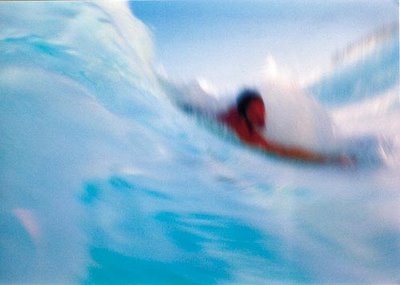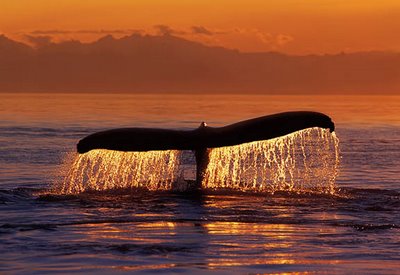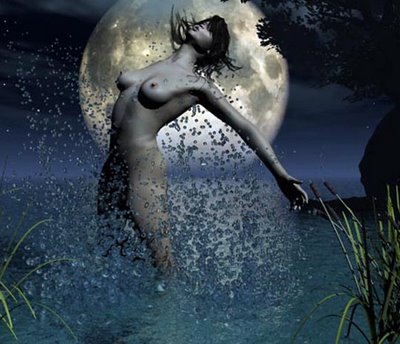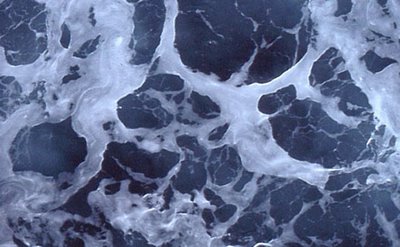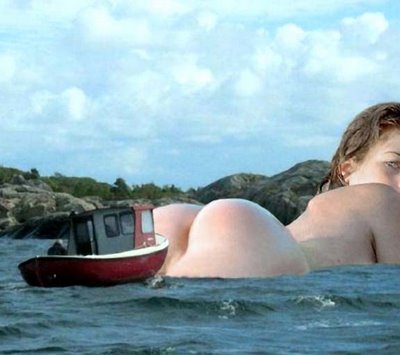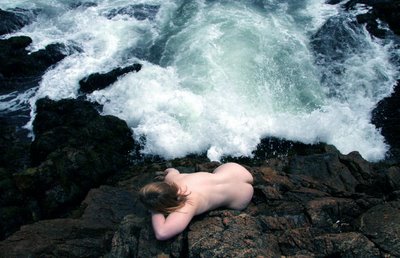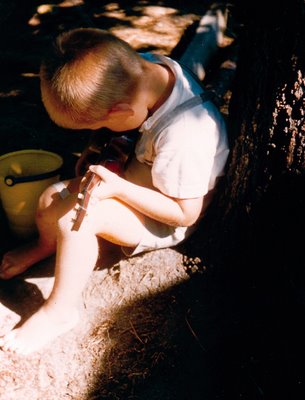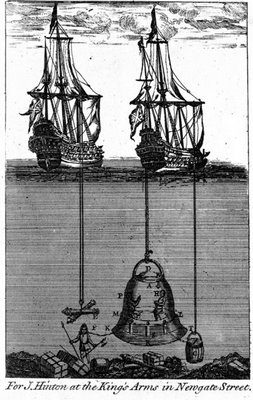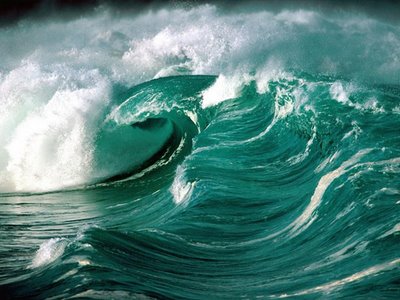 waves
waves1981
waves
carry me carry you
to this beach
so frightened
to be so close
to be so completely here with you
the mist is thick around us
I cannot say how I got here
or remember where I came from
it no longer exists
to touch you
our skin skittish as colts
in a storm
and pass through with you
to a place that has no name
that terrible place of rest
between firmaments
where we become one
and sink there
then wake walking on this grey beach,
home at last,
hearing only the crash
of things forgotten long ago:
waves
waves
THE CHILDREN OF WATERFiona MacLeod
"O hide the bitter gifts of our lord Poseidon"
—Archolochus of Paros
… Long ago, when Manannan, the god of wind and sea, offspring of Lir, the Ocearius of the Gael, lay once by weedy shores, he heard a man and a woman talking. The woman was a woman of the sea, and some say that she was a seal: but that is no matter, for it was in the time when the divine race and the human race and the soulless race and the dumb races that are near to man were all one race.
And Manannan heard the man say: "I will give you love and home and peace." The sea-woman listened to that, and said: "And I will bring you the homelessness of the sea, and the peace of the restless wave, and love like the wandering wind." At that the man chided her and said she could be no woman, though she had his love. She laughed, and slid into green water.
Then Manannan took the shape of a youth, and appeared to the man. "You are a strange love for a seawoman," he said: "and why do you go putting your earth-heart to her sea-heart?" The man said he did not know, but that he had no pleasure in looking at women who were all the same.
At that Manannan laughed a low laugh. "Go back," he said, and take one you'll meet singing on the heather. She's white and fair. But because of your lost love in the water, I'll give you a gift."
And with that Manannan took a wave of the sea and threw it into the man's heart. He went back, and wedded, and, when his hour came, he died.
But he, and the children he had, and all the unnumbered clan that came of them, knew by day and by night a love that was tameless and changeable as the wandering wind, and a longing that was unquiet as the restless wave, and the homelessness of the sea. And that is why they are called the Sliochd-na-mara, the clan of the waters, or the Treud-na-thonn, the tribe of the sea-wave.
And of that clan are some who have turned their longing after the wind and wave of the mind--the wind that would overtake the waves of thought and dream, and gather them and lift them into clouds of beauty drifting in the blue glens of the sky.
How are these ever to be satisfied, children of water?
 ROGUE WAVE
ROGUE WAVEJuly 12
I.
When a storm hit the cruise
ship Norwegian Dawn on
the morning of April 15, 2005
as it neared the Georgian coast,
the gale was nothing special
for the crew -- bigger waves,
harder winds, just hunker
hunker things down &
serve free drinks in the bar --
so what? Then a rogue wave
seven stories high crashed
into the ship’s bow and raced past
as high as the tenth deck,
smashing window, flooding
many cabins & injuring
four passengers. What the
hell was that? all wondered
as the huge wave thundered
behind and was gone. Once
considered freak appearances,
rogues were classed with mermaids
and sea-beasts in the blue catalogue,
a 10,000-year event in the
early calculations of science.
But recently an increasing
pile of data shows suggests
that freak waves are not
so random and may have
sunk dozens of ships. Scientists now
believe that at any given moment
10 rogues are lumbering the
lanes, each with a theoretical
max height of 198 feet. One
theory says that big waves
form with regularity in those
regions which are swept
by hard currents, like
the Agulhas off South Africa a
nd the Gulf Stream
which sweeps the Bermuda
Triangle. Those currents are
so strong that they can pitch
waves like no other force
in the known world.
Another theory adds
the influence of winds
coming from the other
direction, focussing
sets of waves which become
shorter in the distance
between them and
raising individual peaks.
But how then to predict
their arisings and assault,
providing more safety
to the sea-lanes?
One sure sign is when
disparate trains of
waves come together,
often from different
storms. Sometimes
they meet and cancel
each other out;
but other times
it just makes them
(or one especially)
high and higher,
assuming the dread
tower of the rogue.
So far the predictions
have only been successful
off the coast of South
Africa, but give our
hornrims time, the sea
will become safer,
not for any talent
we have for quelling it,
but rather for seeing
far enough into its
foment to divine which
way it rises and then
steer safely away, as coasts
move inland when
a hurricane whirls
down, and farmers get
five minutes to duck
for cover as a
twister roars on through.
Give them time
and sailing will be
like flying: A known
into which old
fears and longings
still harrow the bone.
(source: “Rogue Giants at
Sea,” William J. Broad,
NY Times, 7/11/06
II.
Yes, I know about when
longing smashes into longing
out on the sea-roads of
the heart and then suddenly
all’s calm: That trope
states that two great
desires can only cancel
each other out, straining
too hard for the beloved
to grasp much more than
shade. But what if
waves sometimes collide to form
immenser waves, desire
upon desire heaved and
smashed against all shores?
That my longing’s
scream was flattened
by the night’s own too-loud
gleam is by now
pro forma in these songs, that rope by
which I’ve hauled
up ten thousand tropes.
I venerate that truth
in a dark place in my
heart, a freezing
cathedral with no
roof where empty
seas crash all night.
But perhaps the
very summa
it arch-icily sustains
is floored by an
a priori smash: One
night long ago
(this lower surge
now croons) I found
both her and something
deeper, as if by
seeing a stranger
standing smiling
in the pot-smoke
of party’s room
I saw the woman
in my dream,
the one who
stood naked
in a river while
salmon swam
up past her feet
and through her
bed-to-bed spread
legs. That sight
unleashed a springtime
mash of waters in
my heart, turbbined
by the faintest welcome
in a smile which arced
from party to my bed
where Yes and Yes freaked
the big one, numen
enough (though
I was too young
and greedy to know
it false) to make that
night the wave I’m riding
still in yee-haw bliss
toward all divinely
naked shores. It had
to happen between
me and a her
but not more than
as the surficial key
which unlocked the
my bedded heart,
freeing chamber
to welcome chamber
and rouse and
awful crest whose
magnitude and art
has so far flattened
all comers from without,
even as it waits
in the frozen silence
of longing’s without,
praying and nailing me
to that broken altar
in a ruined chapel
at the bottom of
all seas. For years
I thought my life
was shaped by
two or three rogue
waves which
smashed me
utterly -- a handful
of wild nights
which ebbed to
clear blue drifting
dawns -- but now
I suspect each
vigil here is
productive of a
rogue, incanted and
decanted as the
lines smash hard
against the heart
which loves so much
to read ‘em. See,
this poem’s a mile
high, malefic black
and green up seven
pages of majesty
and mystery, mockery too,
these words pale shouts
into the awesome bassos
of wildly surging seas.
And like blue balls
which cannot hold back
their gouts of lava
ache, I’m desperate
here to find a shore
to loose this monster’s
roar: But where? This
reach of white will have
to do, a snatch of welcome
spread and juiced and
crying for swole depths
of my heart-crazed,
wild Yes: Here’s all my
hell’s brute smash and
thunder, foam wild as
geysered sex or the
spoutings of the whale
who blows this hand across
the page and then dives
back into the gloom of
silence, already hunting
for tomorrow’s song
amid the ribs of
whalers and the
lost bell of my
longing, right here,
forever there.
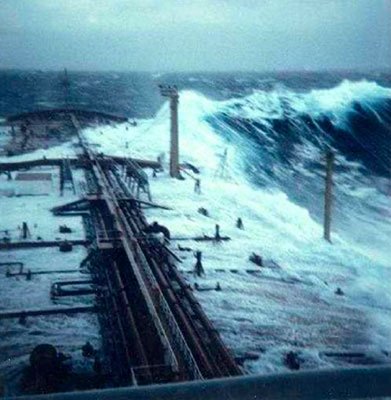 CLIODNA’S WAVE
CLIODNA’S WAVEAND it was in the time of the Fianna of Ireland that Ciabban of the Curling Hair, the king of Ulster's son, went to Manannan's country.
Ciabhan now was the most beautiful of the young men of the world at that time, and he was as far beyond all other kings' sons as the moon is beyond the stars. And Finn liked him well, but the rest of the Fianna got to be tired of him because there was not a woman of their women, wed or unwed, but gave him her love. And Finn had to send him away at the last, for he was in dread of the men of the Fianna because of the greatness of their jealousy.
So Ciabhan went on till he came to the Strand of the Cairn, that is called now the Strand of the Strong Man, between Dun Sobairce and the sea. And there he saw a curragh, and it having a narrow stern of copper. And Ciabhan got into the curragh, and his people said: "Is it to leave Ireland you have a mind, Ciabhan?" "It is indeed," he said, "for in Ireland I get neither shelter nor protection." He bade farewell to his people then, and he left them very sorrowful after him, for to part with him was like the parting of life from the body.
And Ciabhan went on in the curragh, and great white shouting waves rose up about him, every one of them the size of a mountain; and the beautiful speckled salmon that are used to stop in the sand and the shingle rose up to the sides of the curragh, till great dread came on Ciabhan, and he said: "By my word, if it was on land I was I could make a better fight for myself."
And he was in this danger till he saw a rider coming towards him on a dark grey horse having a golden bridle, and he would be under the sea for the length of nine waves, and he would rise with the tenth wave, and no wet on him at all. And he said: "What reward would you give to whoever would bring you out of this great danger?" "Is there anything in my hand worth offering you?" said Ciabhan. "There is," said the rider, "that you would give your service to whoever would give you his help." Ciabhan agreed to that, and he put his hand into the rider's hand.
With that the rider drew him on to the horse, and the curragh came on beside them till they reached to the shore of Tir Tairngaire, the Land of Promise, They got off the horse there, and came to Loch Luchra, the Lake of the Dwarfs, and to Manannan's city, and a feast was after being made ready there, and comely serving-boys were going round with smooth horns, and playing on sweet-sounding harps till the whole house was filled with the music.
Then there came in clowns, long-snouted, long-heeled, lean and bald and red, that used to be doing tricks in Manannan's house. And one of these tricks was, a man of them to take nine straight willow rods, and to throw them up to the rafters of the house, and to catch them again as they came down, and he standing on one leg, and having but one hand free. And they thought no one could do that trick but themselves, and they were used to ask strangers to do it, the way they could see them fail.
So this night when one of them had done the trick, he came up to Ciabhan, that was beyond all the Men of Dea or the Sons of the Gael that were in the house, in shape and in walk and in name, and be put the nine rods in his hand. And Ciabhan stood up and be did the feat before them all, the same as if he had never learned to do any other thing.
Now Gebann, that was a chief Druid in Manannan's country, had a daughter, Cliodna of the Fair Hair, that had never given her love to any man. But when she saw Ciabhan she gave him her love, and she agreed to go away with him on the morrow.
And they went down to the landing-place and got into a curragh, and they went on till they came to Teite's Strand in the southern part of Ireland. It was from Teite Brec the Freckled the strand got its name, that went there one time for a wave game, and three times fifty young girls with her, and they were all drowned in that place. And as to Ciabban, he came on shore, and went looking for deer, as was right, under the thick branches of the wood; and he left the young girl in the boat on the strand.
But the people of Manannan's house came after them, having forty ships. And Iuchnu, that was in the curragh with Cliodna, did treachery, and he played music to her till she lay down in the boat and fell asleep. And then a great wave came up on the strand and swept her away.
And the wave got its name from Cliodna of the Fair Hair, that will be long remembered.
 LONGING
LONGING2002
I sometimes wonder whether longing
can’t radiate out from someone so
powerfully, like a storm, that nothing
can come to him from the opposite
direction. Perhaps William Blake
has somewhere drawn that— Rilke, letter, 1912
There is a longing in us which
grows from sigh to starry shriek.
Perhaps comets are charred furies
of that pain, a whirl of frozen fire
which ghostlike tears to God’s porch
and back, insatiable and unanswered.
Perhaps. All I know is that
it’s infinitely perilous to think
that longing has a human end.
In my cups I once believed
a woman mooned for me,
her longing a white welcome
over my million nights alone.
I met and passed her many times
those hard years, blinded by the aura
of her unvowled name.
Surely when two longings touch
it’s like when great waves collide,
the wild sea witched flat.
Our deeper thirst can never sate:
as each draught of booze
was never enough, so each
embrace tides a milkier door.
I recall a young man
walking home drunk on a
frozen night long ago,
his beloved nowhere
to be found in the chalice
he had named. Winds hurled
steel axes through the
Western sky, failing to clear
the cruel foliage of fate.
In his defeat he was greater
than any angel beckoned
by that night: his heart so
hollowed by longing
as to chance in pure cathedral,
her absence the clabber of a bell
shattering the frozen air,
trebling the moon
without troubling a sound.
FREEZE FRAMEfrom “A Breviary of
Guitars,” late June 2000
What was so arid
in a hammerlock
of high pressure
and a triumphant
angel sun now
just foams &
spouts in storm
after storm:
Every day now
I drive in to
work & see
bump marble
rumps mooning
the heavens:
By lunch they’re
massed ever
empurpled with
fevers hurling
ejaculate snaps
& flooding the
streets: Like new
lovers who cannot
exhaust their
bottomless cistern
of desire hurling
their bodies
at each other
frantic to find
what screams for
release: Storms
again midafternoon
as the day’s
wearies settle
amid problem
accounts & new
AS400 system
woes & programming
patches & the
itch & flick of
a desire which
has no body
it can vanquish
in: But man
it rains hard
a ballsoaking
cuntslobbering
titheave
ballstothewalls
of a storm
in which the
green world
shouts glittery
arias of joy:
The last time
such storm
rose in me
with Donna
was a wan
fair Sunday in
November ‘85
when we drove
to New Smyrna
Beach with her
son Nicky packing
lunch & a bottle
of sherry: Parked
along a deserted
stretch & set
a blanket on
the sand & lounged
there a couple
of hours enjoying
80 degree temps
& the sun
mellow and
sweet & the
surf softly
slapping and
slushing, love
not yet ebbed
& loss early
in its flow: Donna
just beautiful
in a black one
piece bathing
suit that carved
her curves with
authority &
grace & surrender
& her skin a
shock of white
as when she
first peeled
down her panties
for me then
turned her
ass toward my
bright hungry ache:
We sipped our
sherry watching
Nicky play
with a truck
in the sand &
Mr. Mister’s
“Run to Her”
on my boombox
half lost to
the sound of that
swoony merciless
surf: Blue pale
sky, blue green
waters stretching
for miles &
Donna’s eyes
sad and distant,
looking past me:
She got up and
walked down to
to the water’s
edge for a while
soaking up
all that feral
eternity that
makes babies
love & graves
her back to me
as one passing
through a door
into silence:
And then turned
to smile at
me radiant with
all I’ve ever
desired rising
in my heart
like Venus on
the half shell
amid the foam
of my balls &
then looking for
one second like
another woman
on another beach
in another love
which ended
in another surf
& I felt then
the horrid ironic
fatefulness
of the Ocean,
a wave which
parts the thighs
of a love which
births departure:
But Donna
just smiled
bittersweetly and
then as if she
had come to
a decision walked
back and gathered
up Nicky and
put him in
her car telling
him to sleep:
For a few minutes
the boy’s face
(resembling Donna
in the eyes
but the rest
a cipher of
some other man’s
love) crying in
the window but
Donna was
unmoved &
the head slowly
disappeared
like a setting
sun into silence:
Donna then looked
over at me
& smiled the way
she did that night
up at Fern Park
Station & then
lowered her
body on mine
to kiss me full
and dreamy
as the sea her
body breathing
full against mine
like a surf &
her bones against
my bones as
close as bones
go: Kissed slowly
down my chest
in a wave &
gripped my trunks
with both hands
& then pulled
them down far
enough to take
my startled cock
in her mouth
& slowly, sweetly,
gently, deeply
suck that slender
isthmus of flesh
that separates
I and Thou:
Loving there
what’s impossible
to find and
perilous to forget:
I watched her
for a while glide
up and down
my cock with
slow sure strokes
her mouth a
firm clench on
my slick hardening
length, veins there
pumping out like
clouds rising
over the sea
& her eyes closed
maybe prayerfully
or brokenly or
already somewhere
else — who knows:
Her long dark
blonde hair falling
around her pistoning
mouth like
a waterfall & each
downward stroke
washing me in
that gorgeous sure
river or wave
I always felt
in the sex that
joined Donna
to me: Then I
closed my eyes
& lay back
surrendering to
the pleasure
slowly building
in me, so sweet
& watery, not
urgent in the
way of new lovers
or knowledgeable
or secure like
old lovers: Rather
we were as
one receiving
a last kiss from
waters now receding:
Oh drifting boat
on sunny waters
on God’s now
gorgeous earth,
a breeze softly
raking the
glittery soft surf
& Donna’s hand
now cupping my
balls squeezing
& gently milking
the dangerous
seed rising up
there as she
settles her mouth
all the way
down to my
pubic bone &
I’m coming, coming,
rising up in
a wave of white
screaming joy
and she doesn’t
let go but takes
all of me in,
drinks my salty
sticky seed &
it feels so
strange so
utterly fucking
sweet as if
my balls were
dissolving & the
rest of me to
in this tingling
toe twitching
exhalation
emptying
erasing &
killing my
every conflicted
motion: O stay
there for just
a little while,
Breviary — linger
in the lavish
mouth which swallows
me whole: a
mother’s mouth
giving suck &
a receiving back
the milk she
gave me: The
ocean stretching
like a blue gray
angel’s blessing
& “Broken Wings”
on the blaster
true just for those
seconds and
so eternally true:
All the futile
stupid arrogant
wrongheaded
cruel self
destructive
things I wreaked
with that white
boy’s penis
absolved in
that melting
molten spasm:
These million
words flocking
in the wild sperm
cells flocking
to no home
down her throat
just like the
sea welcomes
no home I
have ever built:
One of my
hands inside
her bathing suit
clutching a
breast squeezing
up a nipple
desperate never
to let go:
This gloriously
beautiful ocean
of an angel
of a woman
nursing my
dolphin on the
wave it still
rides: O crest
& dissolve and
there’s no
way to remain
right there, no
way to prevent
the day’s return
into slow focus,
Donna letting
go with her
mouth kissing
the tip of my
glistening cock
& pulling my
shorts back
up with a sigh
patting my cock
and nuts one
one one one
one one one
one one one
final time: Wipes
her mouth with
her hand her
eyes slowly
refocusing taking
aim again beyond
me: I lift
up on an elbow
& try to push
her down to
kiss, return the
favor by lapping
away at her
sweet milky
thighs but she
shakes her head
sad and firm
& takes a drink
of wine instead
& looks farther
out to a sea
already gone:
O lift up from
that beach O
falcon o sad
sea eagle up
up over to
the edge of that
one infinite
spasm that
crashed up out
of me and through
me at the
same time like
the wave of
the woman of
the sea anointing
& cursing
me like that
baptismal wave
that crested
over me at 14:
Rise up over
the ocean’s
suck & haul
o angel of
my eternally
misbegotten love:
Up over the
rim of the green
ocean and up
up through the
blue heavens:
Up over the
hurl of this
ancient song:
Can you take
me higher o
peregrine
falcon up
where only
blind men see:
Up over the
edge of
my ruination
at your altar
o dolphin muse:
Join me with
my aborted
children, my
daughters of
Neptune: Can
you fly me up
over all to this
warm place
where my seed
lays waiting for
your welcoming
egg in the
belly of all
dead loves: Donna’s
son begins
crying in the
car & she
goes to retrieve
him & we start
packing up
to go: “Run
to Her” on the
blaster already
ironic and Donna
asks me
irritably hey
isn’t there anything
else you can
play? Something
that
rocks? 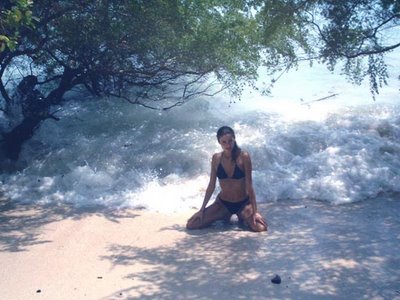 THE FLOOD
THE FLOOD2000
Your house by the sea
is not a married one.
You are lonely for your wife
remembering how soft
and open she sleeps,
her pale body curving
and falling around
a green silk nightdress.
There is a girl inside
that woman damaged
perhaps too much
by your careens.
Your heart breaks
thinking of her
and so you call her
saying, I’m coming home.
She does not respond,
her silence both still
and oceanic.
You head to the
bedroom to start
packing a suitcase
when you notice
sea-water mashed
against the window
and rising fast.
Safe where you are
but desperate to
go home to her
you chance the door.
Cold water falls
down on you
in a thundering cascade.
You think you
will drown but in the
next scene you stand
in a room harrowed
but dry: The couch
and table with its
telephone just
the way you
remembered them
from the day before
when all was well
but now ruined and
dangerous to touch.
It is a room haunted
by its drowning
unliveable and fell.
You wake with a
start to a ringing
telephone. Your wife now
hates you for what
you let in that door
trying to get back to her.
 WAVE WILDERNESS
WAVE WILDERNESS2001
Witness a wide
virago of water:
One wave rising
to engulf a city.
I return here
at the end of a dream,
neither angry nor
afraid, simply ending
at this beach
from the rag
ends of another
ragged night, drunk,
dreary, my
lust a futile,
laughable thing ...
Return to this
beach soon annihilate
in the majesty of
that steel water,
reclaiming at
last this syzygy
of psalms: Bereave
me here, my
children, my poems:
Into that wave
I cast my book:
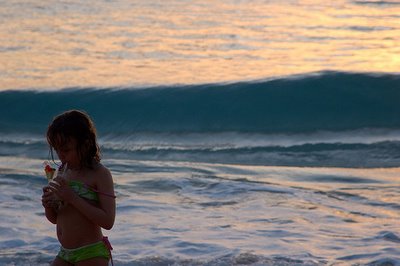 WIND ON WATER
WIND ON WATERJuly 13
I hear words rising in my
heart’s thought and write
them down, as wind breathes
waves on water, as spirit
billows the sails of day
to ache our arch perfections.
Who knows how far these
rollers will go, or what
shores they’ll rise and
crash against in metronymic
sets of roared silence,
the unsaid said at last
and freed to hoove the next?
Think of the seven seas’
incessant toil and these
daily jaunts of words
on paper make blue sense,
though inland on dry
ground both seem like
a puerile waste
of ink and water,
so much fraught tillage
forever scythed away
with each wave’s fold
and crash. For eons
the human task
was to subdue the world
with mastery of tool
and word: But anyone
who attempts to
cross the sea or build
a fortress on its shore
soon learns that
mother always wins
her doubting dumbass
children back and
sweeps their alms away
in a lush blue swell
bound straight for hell.
Having learned
I can’t beat her (oh
that sea of instructive
deadly nights!), I
turned to join her fray,
becoming the sea’s
own chantey, praising
in this lost and outre
way the strolling
wave which curves
so much like her
that to sing of waves
is to nurse on her
and plunge her every
surf and remit all
urgencies in the crash
and dash and scatter of
divinely foaming milk.
I breathe slow and measured
on the page the claw
and sphincter of God’s
rage so each wave is
laced with gysms too hot
and frenzied for a name,
offering sperm saddle
for the nymph who
choirs astride my hips
as I cross the seas to
hurl my half of Him in Her.
Can you hear the
thrashing of first cold seas
in the dropped shell
of Her surf, the one
I soon leave behind
for days to grind to sand?
Do you hear
those sighs which
enclosed my tensed
collapsing thighs?
Eternal pause of all that
wind on water, my
words upon this page,
my breath slowing at her
neck as we drift now
off to sleep into the
sea’s own clear blue space
inside the bottle
I can’t drink without
drowning in its dregs,
this poem a tiny slip
of paper rolled and
tucked into the hold
of a ship fit in that
bottle’s reach,
a ship whose nippled
masthead begs
to be loosed inside
the marges of your
ears: And all of
whispering in this
tossed mouth’s
ebbing surf,
We are here ...
Are you there?
We are here ...
Do you dare?THE NINTH WAVEFiona McLeod
... On the last Sabbath, old McAlpin had held a prayer-meeting in his little house in the " street," in Balliemore of Iona. At the end of his discourse he told his hearers that the voice of God was terrible only to the evil-doer but beautiful to the righteous man, and that this voice was even now among them, speaking in a thousand ways and yet in one way. And at this moment, that elfin granddaughter of his, who was in the byre close by, let go upon the pipes with so long and weary a whine that the collies by the fire whimpered, and would have howled outright but for the Word of God that still lay open on the big stool in front of old Peter. For it was in this way that the dogs knew when the Sabbath readings were over; and there was not one that would dare to bark or howl, much less rise and go out, till the Book was closed with a loud, solemn bang. Well, again and again that weary quavering moan went up and down the room, till even old McAlpin smiled, though he was fair angry with Elsie. But he made the sign of silence, and began: " My brethren, even in this trial it may be the Almighty has a message for us " --when at that moment Elsie was kicked by a cow, and fell against the board with the pipes, and squeezed out so wild a wail that McAlpin, started up and cried, in the Lowland way that he had won out of his wife, "Hoots, havers, an' a! come oot o' that, ye Deil's spunkie!"
So it was this memory that made Padruig and Ivor smile. Suddenly Ivor, began with a long rising and falling cadence, an old Gaelic rune of the Faring of the Tide.
Athair, A mhic, A Spioraid Naoimh,
Biodh an Tri-aon leinn, a la's a dh'oidhche;
S'air, chul nan tonn, no air thaobh nam beann!
O Father, Son, and Holy Spirit,
Be the Three-in-One with us day and night,
On the crested wave, when waves run high!
And out of the place in the West
Where Tir-nan-Og, the Land of Youth
Is, the Land of Youth everlasting,
Send the great Tide that carries the sea-weed
And brings the birds, out of the North:
And bid it wind as a snake through the bracken,
As a great snake through the heather of the sea,
The fair blooming heather of the sunlit sea.
And may it bring the fish to our nets,
And the great fish to our lines:
And may it sweep away the sea-hounds
That devour the herring:
And may it drown the heavy pollack
That respect not our nets
But fall into and tear them and ruin them wholly.
And may I, or any that is of my blood,
Behold not the Wave-Haunter who comes in with the Tide,
Or the Maighdeann-màra who broods in the shallows,
Where the sea-caves are, in the ebb:
And fair may my fishing be, and the of those near to me,
And good may this Tide be, and good may it bring:
And may there be no calling in the Flow, this Srùthmàra,
And may there be no burden in the Ebb! Ochone!
An ainm an Athar, s'an Mhic, s' an Spioraid Naoimh, Biodh an Tri-aon leinn, a la's a dh' oidhche,
S'air chul nan tonn, no air thaobh nam beann!
Ochone! arone!
Both men sang the closing lines with loudly swelling voices and with a wailing fervour which no words of mine could convey.
Runes of this kind prevail all over the isles, from the Butt of Lewis to the Rhinns of Islay: identical in spirit, though varying in lines and phrases, according to the mood and temperament of the rannaiche or singer, the local or peculiar physiognomy of nature, the instinctive yielding to hereditary wonder-words, and other compelling circumstances of the outer and inner life. Almost needless to say, the sea-maid or sea-witch and the Wave-Haunter occur in many of those wild runes, particularly in those that are impromptu. In the Outer Hebrides, the runes are wild natural hymns rather than Pagan chants; though marked distinctions prevail there also-for in Harris and the Lews the folk are Protestant almost to a man, while in Benbecula and the Southern Hebrides the Catholics are in a like ascendancy. But all are at one in the common Brotherhood of Sorrow.
The only lines in Ivor McLean's wailing song which puzzled me were the two last which came before "the good words," in the name of the Father, the Son, and the Spirit," etc.
"Tell me, in English, Ivor," I said, after a silence, wherein I pondered the Gaelic words, " what is the meaning of--
'And may there be no calling in the Flow, this Srùthmàra,
And may there be no burden in the Ebb?'"
" Yes, I will be telling you what is the meaning of that. When the great tide that wells out of the hollow of the sea, and sweeps toward all the coasts of the world, first stirs, when she will be knowing that the Ebb is not any more moving at all, she sends out nine long waves. And I will be forgetting what these waves are: but one will be to shepherd the sea-weed that is for the blessing of man, and another is for to wake the fish that sleep in the deeps, and another is for this, and another will be for that, and the seventh is to rouse the Wave-Haunter and all the creatures of the water that fear and bate man, and the eighth no man knows, though the priests say it is to carry the Whisper of Mary, and the ninth--"
" And the ninth, Ivor?"
" May it be far from us, from you and from me and from those of us! An' I will be sayin' nothing against it, not I; nor against anything that is in the sea! An' you will be noting that!
" Well, this ninth wave goes through the water on the forehead of the tide. An' wherever it will be going it calls. An' the call of it is, ' Come away, come away, the sea waits! Follow! . . . Come away, come away, the sea waits! Follow!'
An' whoever hears that must arise and go, whether he be fish or pollack, or seal or otter, or great skua or small tern, or bird or beast ofthe shore, or bird or beast of the sea, or whether it be man or woman or child, or any of the others."
" Any of the others, Ivor? "
" I will not be saying anything about that," replied McLean, gravely; " you will be knowing well what I mean, and if you do not it is not for me to talk of that which is not to be talked about.
[1 Ivor, of course, gave these words in the Gaelic, the sound of which has the strange wail of the sea in it.]
" Well, as I was for saying: that calling of the ninth wave of the Tide is what Ian-Mòr of the hill speaks of as 'the whisper of the snow that falls on the hair, the whisper of the frost that lies on the cold face of him that will never be waking again."'
" Death? "
" It is you that will be saying it.
" Well," he resumed after a moment's hush, " a man may live by the sea for five score years and never hear that ninth wave call in any Srùth-màra, but soon or late he will bear it. An' many is the Flood that will be silent for all of us: but there will be one Flood for each of us that will be a dreadful Voice, a voice of terror and of dreadfulness. And whoever hears that Voice, he for sure will be the burden in the Ebb."
" Has any heard that Voice, and lived?
McLean looked at me, but said nothing. Padruig Macrae rose, tautened a rope, and made a sign to me to put the helm alee. Then, looking into the green water slipping by--for the tide was feeling our keel, and a stronger breath from the sea lay against the hollow that was growing in the sail--he said to Ivor:
"You should be telling her of Ivor MacIvor mhic Niall."
"Who was Ivor MacNeil?" I said.
"He was the father of my mother," answered McLean, " and was known throughout the north isles as Ivor Carminish, for he had a farm on the eastern lands of Carminish which lie between the hills called Strondeval and Rondeval, that are in the far south of the northern Hebrides, and near what will be known to you as the Obb of Harris.
" And I will now be telling you about him in the Gaelic, for it is more easy to me, and more pleasant for us all.
" When Ivor MacEachainn Carminish, that was Ivor's father, died, he left the farm to his elder son and to his second son, Seumas. By this time, Ivor was married, and had the daughter who is my mother. But he was a lonely man, and an islesman to the heart's core. So . . . but you will be knowing the isles that lie off the Obb of Harris-the Saghay, and Ensay, and Killegray, and farther west, Berneray and, north-west, Pabaidh, and beyond that again, Shillaidh? "
For the moment I was confused, for these names are so common: and I was thinking of the big isle of Berneray that lies in huge Loch Roag that has swallowed so great a mouthful of Western Lewis, to the seaward of which also are the two Pabbays, Pabaidh Mòr and Pabaidh Beag. But when McLean added," and other isles of the Caolas Harrish " (the Sound of Harris), I remembered aright; and indeed I knew both, though the nor' isles better, for I had lived near Callernish on the inner waters of Roag.
" Well, Carminish had sheep-runs upon some of these. One summer the gloom came upon him, and he left Seumas to take care of the farm and of Morag his wife, and of Sheen their daughter; and he went to live upon Pabbay, near the old castle that is by the Rua Dune on the southeast of the isle. There he stayed for three months. But on the last night of each month he heard the sea calling in his sleep; and what he heard was like 'Come away, come away, the sea waits! Follow . . . Come away, co e away, the sea waits! Follow!' And he knew the voice of the ninth wave; and that it would not be there in the darkness of sleep if it were not already moving toward him through the dark ways of An Dàn (Destiny). So, thinking to pass away from a place doomed for him, and that he might be safe elsewhere, he sailed north to a kinsman's croft on Aird-Vanish in the island of Taransay. But at the end of that month he heard in his sleep the noise of tidal waters, and at the gathering of the ebb he heard
' Come away, come away, the sea waits! Follow!' Then once more, when the November heat-spell had come, he sailed farther northward still. He stopped a while at Eilean Mhealastaidh, which is under the morning shadow of high Griomabhal on the mainland, and at other places, till he settled, in the third week, at his cousin Eachainn MacEachainn's bothy, near Callernish, where the Great Stones of old stand by the sea, and hear nothing forever but the noise of the waves of the North Sea and the cry of the sea-wind.
" And when the last night of November had come and gone, and he had heard in his sleep no calling of the ninth wave of the Flowing Tide, he took heart of grace. All through that next day he went in peace. Eachainn wondered often with slant eyes when he saw the morose man smile, and heard his silence give way now and again to a short, mirthless laugh.
" The two were at the porridge, and Eachainn was muttering his Buich-eas dha'it Ti, the Thanks to the Being, when Carminish suddenly leaped to his feet, and, with white face, stood shaking like a rope in the wind.
" ' In the name of the Son, what is it, Ivor mhic Ivor? What is it, Carminish?' cried Eachainn..
" But the stricken man could scarce speak. At last, with a long sigh, he turned and looked at his kinsman, and that look went down into the shivering heart like the polar wind into a crofter's hut.
" ' What will be that? ' said Carminish, in a hoarse whisper.
" Eachainn listened, but he could hear no wailing beann-sith, no unwonted sound.
" ' Sure, I hear nothing but the wind moaning through the Great Stones, an' beyond them the noise of the Flowin' Tide. '
" ' The Flowing Tide! The Flowing Tide! ' cried Carminish, and no longer with the hush in the voice. 'An' what is it you hear in the Flowing Tide?'
" Eachainn looked in silence. What was the thing he could say? For now he knew.
" Ah, och, och, ochone, you may well sigh, Eachainn mhic Eachainn! For the ninth wave o' the Flowing Tide is coming out o' the North Sea upon this shore, an' already I can hear it calling, ' Come away, come away, the sea waits! Follow! . . . Come away, come away, the sea waits! Follow!'
And with that Carminish dashed out the light that was upon the table, and leaped upon Eachainn, and dinged him to the floor and would have killed him but for the growing noise of the sea beyond the Stannin' Stones o' Callanish, and the woe-weary sough o' the wind, an' the calling, calling, 'Come, come away! Come, come away!'
" And so he rose and staggered to the door, and flung himself out into the night, while Eachainn lay upon the floor and gasped for breath, and then crawled to his knees, an' took the Book from the shelf by his fern-straw mattress, an' put his cheek against it, an' moaned to God, an' cried like a child for the doom that was upon Ivor Maclvor mhic Niall, who was of his own blood, and his own fosterbrother at that.
" And while he moaned, Carminish was stalking through the great, gaunt, looming Stones of the Druids, that were here before St. Colum and his Shona came, and laughing wild. And all the time the tide was coming in, and the tide and the deep sea and the waves of the shore and the wind in the salt grass and the weary reeds and the black-pool gale made a noise of a dreadful hymn, that was the death-hymn, the going-rune, of Ivor the son of Ivor of the kindred of Niall.
" And it was there that they found his body in the grey dawn, wet and stiff with the salt ooze. For the soul that was in him had heard the call of the ninth wave that was for him. So, and may the Being keep back that hour for us, there was a burden upon that Ebb on the morning of that day.
" Also, there is this thing for the hearing. In the dim dark before the curlew cried at dawn, Eachainn heard a voice about the house, a voice going like a thing blind and baffled,
'Cha till, cha till, cha till mi tuille!
I return, I return, I return never more!
--from The Works of Fiona McLeod, Volume II
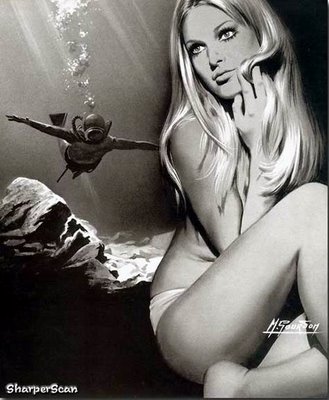 WAVE RAVE
WAVE RAVEfrom "A Breviary of
Guitars," 2000
The present/
Autumn 1985:
The wave the sea
woman dashed
on me in the
welcome of
a few melusines
has baptized me
into a curve
and curl, an
arch foam
ache and break:
I accept today
that such loves
may have only
been moonbeams,
faulty ego
boundaries &
juvenile whim:
But the wave
itself is
one of the greater
angels, a titanic
motion swelling
up to kiss the
moon: One night
many years later
I walked Cocoa
Beach with a
woman Donna’s
age long after
Donna swam away:
A full moon
high above a
surf impossibly
stirred by a
hurricane
200 miles
out to sea; Waves
like we had
never seen at
that timid beach
scrolling in
huge dark swells
& the smash
& hiss of surf
a dull pounding
blissful roar:
Silver milk
in those waves
poured from
a crazy moon
& a stiff warm
breeze blowing
through the desire
we felt for each
other but could
not, would not
touch for the ties
she kept with
another: A
dazzling night
in which we
were gifted
with a sea so
few would ever
see: Some time
after midnight
on that silvered
beach where
angels sang
brokenly & eternally
of desire and its
terrible torn
beauty we stopped
talking & listened
& looked
& touched each
other’s hand, just
once, hugged,
just once, kissed
for a second then
turned to go:
I wrote a poem
on it and later
set the night
to music on
a keyboard
synthesizer (no
guitar could
suffice, I’ve learned)
tolling these
slow sure chords,
Emaj7 - Cmin7
F#min7 - Amaj7,
composing wave
after wave
of basso bellows
& swelling strings
& dazed dreamy
overtones caught
in the suck and
the roar of
a remembered night:
O I’m still
desperate to
describe the wave
of the sea woman
rising in me
in you impossibly
high fraught
with the ache
and plunge of
perfect union,
sure in its
rhythm & pulse
& chording &
broken utterly
when cusp trembles
foams & turns
down at the
moment of coming
falling weightless
for aeons in a
sheer glass curve
collapsing in a
smash and a
roar into oblivion:
I’m 43 now
and doubt
any such wave
does more than
shipwreck &
estrange us from
all we build and
strive for in
such difficulty:
No marriage
abides by such
a wave, no
poems or songs
ever summon
it truly back &
it’s an utterly
selfish amoral
unworthy
unwholesome
surrender no
one else in the
world gives
one tiny turd for:
Yet I desired
her & she kissed
me with that wave
& I can’t stop
this furious scrawl
down the page
mounting this
babel of joy:
Yesterday in
the spinning class
the instructor
was both lovely
& cruel, asking
us to pedal
harder faster up
an impossible
slope: It was
then that I truly
saw the wave I here
praise, this fearsome
nor’easter of a
swell curving
up high high
and higher,
mountainous to
moon: Oh
the teacher was
almost beyond
my heart & I
almost gave out
toward the end,
staying in gear
12 while she called
out 13, 14, 15:
She finally let
us go to
downshift &
pedal mad down
the hill & then
slow & slow
& slow till we
pedalled air
in sleepy arcs:
Of course she’s
this muse that
sirens me out
of too little
sleep & then swims
out just beyond
the tip of this
pen singing, “Come—”:
She was in the
3 or 4 women
who for whatever
reasons undressed
me in her waters
& then drowned me:
She stands beside
the real women
I have actually
loved judging their
passions which
always melt
into a deeper
surer love &
flashes her
booty whispering
“you could have
chosen
this, you
know”: I cannot
surrender to
her but I will
not let her go:
Blue green monster
rising sinister
& ecstatic toward
a shore of loins
my balls throb
and pulse for
desperate for just
one smooch of
that hopeless
homeless hocus
hooch of
coochie coo
invoked in this
Breviary, this
blue green wave
reaching for
a fruit I can
never reach,
never burst, till
death do I
truly die: Such
is the passionate
singing I can
no more forget
than the sea
can reclaim it’s
orphaned moon:
Ah desperate
I am this morning
stung and dazed
by the foam of
one wave so
fucking long ago
rising anew here:
And I’m judged
as unworthy now
as I was then:
My hands weary
& aching & tingling
& the loam of
pages fattening
into a mound,
a mountain,
a sea, a cosmos
in the hollows
of a conch, a
pale flickering
dream at the
end of a farewell
& still I can’t
name it or
claim it
nor most of
all let it go:
The woman
of the sea has
exactly what
she wished: And
I her wandering
wounded dolphin
surfer watch the
horizon and wait
for the waters to
heave the next
slow swelling chord:
